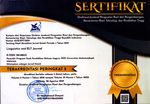The Students’ Common Grammatical Mistakes in Writing Argumentative Essay Through Impromptu Theme
Abstract
The objective of the study was to discover the prevalent grammatical errors made by students in their English writing. This was done by analyzing impromptu essays written by seventh-semester students in the English language education program at the University of Muhammadiyah Sorong. The study utilized a descriptive qualitative research design. The study sample comprised 18 students in their seventh semester, recruited using purposive sampling. The research data were collected from the participants' argumentative essays, which served as the writing assessment centered around the theme, "Grades do not accurately reflect one's intelligence." The researcher employed the qualitative data analysis technique developed by Miles and Huberman. This technique involved data reduction, display, and conclusion drafting through the examination of the students' essay worksheets. According to the analyzed data, it was determined that the students frequently made grammatical errors when composing an argumentative essay. The grammatical errors can be classified into three categories: primary, secondary, and functional. The main category comprised errors in nouns, verbs, determiners, pronouns, prepositions, conjunctions, and adjectives. The secondary group encompassed errors related to numerical representation and verb form. Next, the functional category comprised errors in both the subject and predicate. According to the findings from three kinds of research, the predominant grammatical errors committed by pupils are related to verbs.
Keywords
Full Text:
PDFReferences
V. T. Phuong, “The effects of instructional scaffolding for writing skill of English majored students,” Perspektivy Nauki i Obrazovania, vol. 64, no. 4, pp. 158–169, 2023, doi: 10.32744/pse.2023.4.10.
N. O. Ceylan, “Student perceptions of difficulties in second language writing,” Journal of Language and Linguistic Studies, vol. 15, no. 1, pp. 151–157, 2019, doi: 10.17263/jlls.547683.
S. Z. Haider, R. Ali, and M. Ikram, “Analyzing The Effect Of English Subject Teaching On The English Writing Skills Of Secondary School Student,” Global Educational Studies Review, vol. V, no. I, pp. 19–28, Mar. 2020, doi: 10.31703/gesr.2020(v-i).03.
V. Agustiana, “Combining Product and Process-Based Approaches to Teaching Writing Discussion Texts,” ENGLISH REVIEW: Journal of English Education, vol. 4, no. 2, pp. 1–14, 2016, [Online]. Available: https://journal.uniku.ac.id/index.php/ERJEE
A. Koura and F. Zahran, “Using Habits of Mind to Develop EFL Writing Skills and Autonomy,” Arab World English Journal, vol. 8, no. 4, pp. 183–198, Dec. 2017, doi: 10.24093/awej/vol8no4.12.
N. N. Sukmawati and S. S. Nasution, “Genre-Based Approach: Can It Improve the Informatics Engineering Students’ Writing Skill?,” JEES (Journal of English Educators Society), vol. 5, no. 1, pp. 95–102, Apr. 2020, doi: 10.21070/jees.v5i1.395.
F. De Smedt, E. Merchie, M. Barendse, Y. Rosseel, J. De Naeghel, and H. Van Keer, “Cognitive and Motivational Challenges in Writing: Studying the Relation With Writing Performance Across Students’ Gender and Achievement Level,” Read Res Q, vol. 53, no. 2, pp. 249–272, Apr. 2018, doi: 10.1002/rrq.193.
E. Cer, “The Instruction of Writing Strategies: The Effect of the Metacognitive Strategy on the Writing Skills of Pupils in Secondary Education,” Sage Open, vol. 9, no. 2, pp. 1–17, Apr. 2019, doi: https://doi.org/10.1177/2158244019842681.
M. Michel, A. Révész, X. Lu, N. E. Kourtali, M. Lee, and L. Borges, “Investigating L2 writing processes across independent and integrated tasks: A mixed-methods study,” Second Lang Res, vol. 36, no. 3, pp. 307–334, Jul. 2020, doi: 10.1177/0267658320915501.
P. Deane, “Building and Justifying Interpretations of Texts: A Key Practice in the English Language Arts,” ETS Research Report Series, vol. 2020, no. 1, pp. 1–53, Dec. 2020, doi: 10.1002/ets2.12304.
W. Zheng and L. Yin, “Characterization inference based on joint-optimization of multi-layer semantics and deep fusion matching network,” PeerJ Comput Sci, vol. 8, 2022, doi: 10.7717/PEERJ-CS.908.
A. Locatelli, “(How) Can Recent Cognitive Studies Contribute to Literary Interpretation?,” Armenian Folia Anglistika, vol. 16, no. 1, pp. 137–156, 2020, doi: https://doi.org/10.46991/afa/2020.16.1.137.
S. Shrestha, “Analyzing Grammatical Errors in Students’ Essays: the case of BBS 1st Year Management Students at Bal Kumari College,” 2024. [Online]. Available: http://balkumaricollege.edu.np/journal
M. Chávez Chávez and K. Valenzuela Ponce, “Grammatical Errors in Pre-service English Teachers’ Argumentative Essays and their Views Regarding Error Correction,” Foro Educacional, no. 40, pp. 65–99, Jul. 2023, doi: 10.29344/07180772.40.3314.
J. VanDerHeide, “Classroom Talk as Writing Instruction for Learning to Make Writing Moves in Literary Arguments,” Read Res Q, vol. 53, no. 3, pp. 323–344, Jul. 2018, doi: 10.1002/rrq.196.
K. Phommavongsa, S. Xaysetha, and S. Phomchaleun, “The Common Grammatical Errors In Writing Narrative Essay Of Students At The Youth Resource Center, Savannakhet,” Jurnal Penelitian Humaniora, vol. 22, no. 1, pp. 1–13, Jan. 2021, doi: 10.23917/humaniora.v22i1.11501.
J. M. Abbas, M. S. Mohd. Yasin, and K. Ismail, “Arabic Language Influence on the Iraqi EFL Tertiary Learners’ Use of Grammatical Cohesive Devices in their Argumentative Essays,” European Journal of Social Sciences Education and Research, vol. 6, no. 1, p. 56, Apr. 2016, doi: 10.26417/ejser.v6i1.p56-64.
A. A. B. Mohd Noor and A. Bin Sopian, “Correlation Between Level of Grammar Proficiency and Arabic Speaking Skills of Diploma Students At UITM,” International Journal of Academic Research in Business and Social Sciences, vol. 13, no. 4, Apr. 2023, doi: 10.6007/ijarbss/v13-i4/16630.
A. Purba, “How First and Second Languages Influence Indonesian Students’ English as a Third Language: Transfer and Interference Analysis,” Elsya : Journal of English Language Studies, vol. 4, no. 2, pp. 147–156, Jun. 2022, doi: 10.31849/elsya.v4i2.8704.
J. CANTINA, “Linguistics in Social Media: An Analysis on the Writing Conventions of Students’ Blog Posts,” Sprin Journal of Arts, Humanities and Social Sciences, pp. 15–23, Nov. 2022, doi: 10.55559/sjahss.v1i11.63.
S. Mohideen, “Error Analysis of a Sample of Kuala Kangsar University Students’ English Placement Writing Test,” SALTeL Journal (Southeast Asia Language Teaching and Learning), vol. 6, no. 1, pp. 27–33, Jan. 2023, doi: 10.35307/saltel.v6i1.100.
Z. He, “English Grammar Error Detection Using Recurrent Neural Networks,” Sci Program, vol. 2021, 2021, doi: 10.1155/2021/7058723.
N. N. Jalalzai, F. Looni, and A. Umer, “Teachers’ Written Feedback Practices in Promoting Academic Writing Skills of ESL Learners,” Journal of Social Sciences Review, vol. 3, no. 1, pp. 244–250, Jan. 2023, doi: 10.54183/jssr.v3i1.145.
V. Chandra Segaran and H. Hashim, “‘More Online Quizzes, Please!’ The Effectiveness of Online Quiz Tools in Enhancing the Learning of Grammar among ESL Learners,” International Journal of Academic Research in Business and Social Sciences, vol. 12, no. 1, Jan. 2022, doi: 10.6007/ijarbss/v12-i1/12064.
DOI: https://doi.org/10.31764/leltj.v12i1.24368
Refbacks
- There are currently no refbacks.
Copyright (c) 2024 Heriyanti - Tahang

This work is licensed under a Creative Commons Attribution-ShareAlike 4.0 International License.
_____________________________________________________
Linguistics and ELT Journal
p-ISSN 2339-2940 | e-ISSN 2614-8633

LELTJ is licensed under a Creative Commons Attribution-ShareAlike 4.0 International License.
_____________________________________________________
LELTJ is abstracting & indexing in the following databases:
_____________________________________________________
LELTJ Editorial Office:













